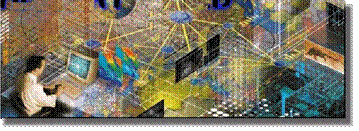|
|
|
Letís face it, a
minimal condition for some sort of new, ěpostî human condition would
certainly be a fundamental shift in our notions of material reality. By
exploring the recent rapid developments in imaging technologies, robotics,
and simulation in surgery. I hope to suggest some of the pathways through
which a so-called post-human future might come about.Ý Experience of materiality and our notions
of the real are deeply tied to technologies that affect how we experience
space and time and how we use our bodies. Changes in these technologies have
a profound impact on our sense of materiality and of the real.
|
|
|
|
The story I want
to tell is deeply wrapped up with the history of new media. To paraphrase
Friedrich Kittler: Media inscribe our situation.
|
|
|
|
But we do not
just switch on the computer and awake to a new ontology. Media are
institutions. At stake here is more than the difficult task of constructing
computer chips, parallel processors, massively distributed networks, etc. but
also of configuring users and especially of configuring the senses of users.
For me media are institutions embedded in hardware, and the history of their
construction is a history also of resistance. I hope to make that apparent as
we go on.
|


